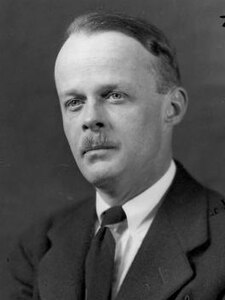Allen Tate
| Allen Tate | |
|---|---|
 |
|
| Born |
November 19, 1899 Winchester, Kentucky, USA |
| Died | February 9, 1979 (aged 79) Nashville, Tennessee, USA |
| Occupation | Poet, essayist |
| Nationality | United States |
| Genre | Poetry, literary criticism |
| Literary movement | New Criticism |
| Notable works | "Ode to the Confederate Dead" |
| Spouse | Caroline Gordon |
John Orley Allen Tate (November 19, 1899 – February 9, 1979), known professionally as Allen Tate, was an American poet, essayist, social commentator, and Poet Laureate from 1943 to 1944.
Tate was born near Winchester, Kentucky, to John Orley Tate, a businessman, and Eleanor Parke Custis Varnell. In 1916 and 1917 Tate studied the violin at the Cincinnati Conservatory of Music.
He began attending Vanderbilt University in 1918, where he met fellow poet Robert Penn Warren. Warren and Tate were invited to join an informal literary group of young Southern poets under the leadership of John Crowe Ransom; the group were known as the Fugitives. Tate contributed to the group's magazine The Fugitive. The aim of the group, according to the critic J. A. Bryant, was "to demonstrate that a group of southerners could produce important work in the medium [of poetry], devoid of sentimentality and carefully crafted," and they wrote in the formalist tradition that valued the skillful use of meter and rhyme.
Tate also joined Ransom to teach at Kenyon College in Gambier, Ohio. Some of his notable students there included the poets Robert Lowell and Randall Jarrell. Lowell's early poetry was particularly influenced by Tate's formalist brand of Modernism.
In 1924, Tate moved to New York City where he met poet Hart Crane, with whom he had been exchanging correspondence for some time. Over a four-year period, he worked freelance for The Nation, contributed to the Hound & Horn, Poetry magazine, and others. To make ends meet, he worked as a janitor. (Some years later, he would also contribute articles to the conservative National Review.)
...
Wikipedia
